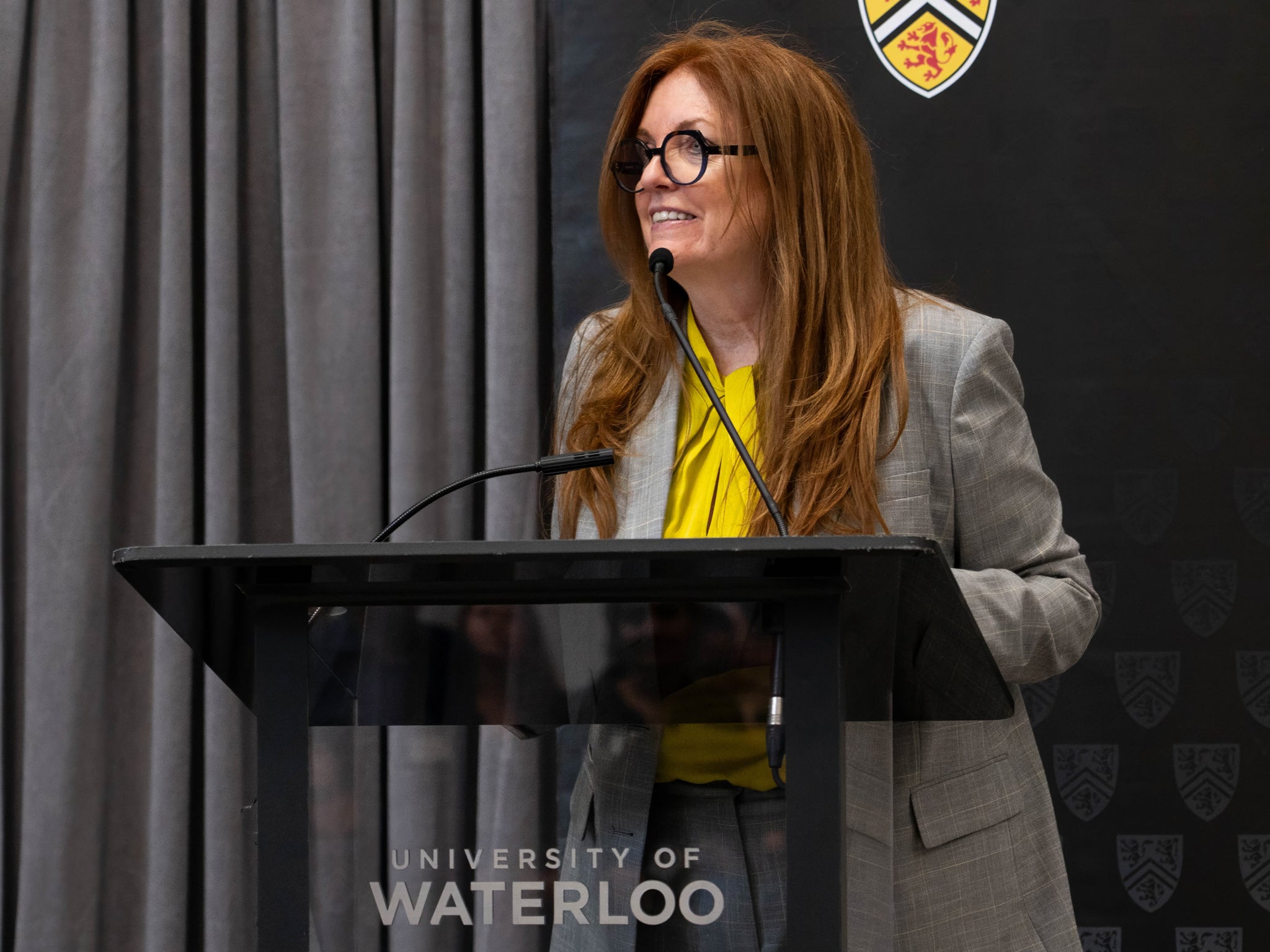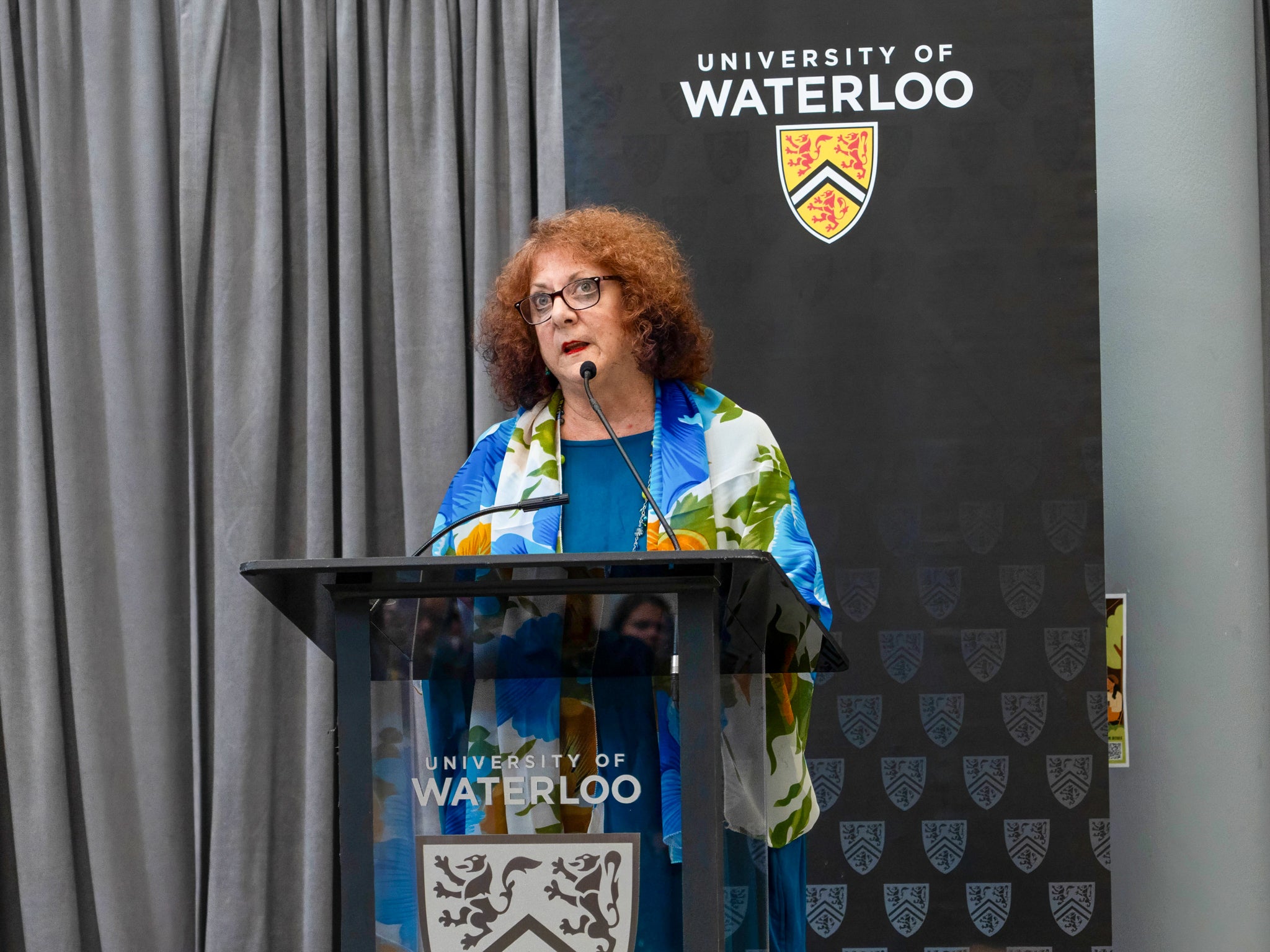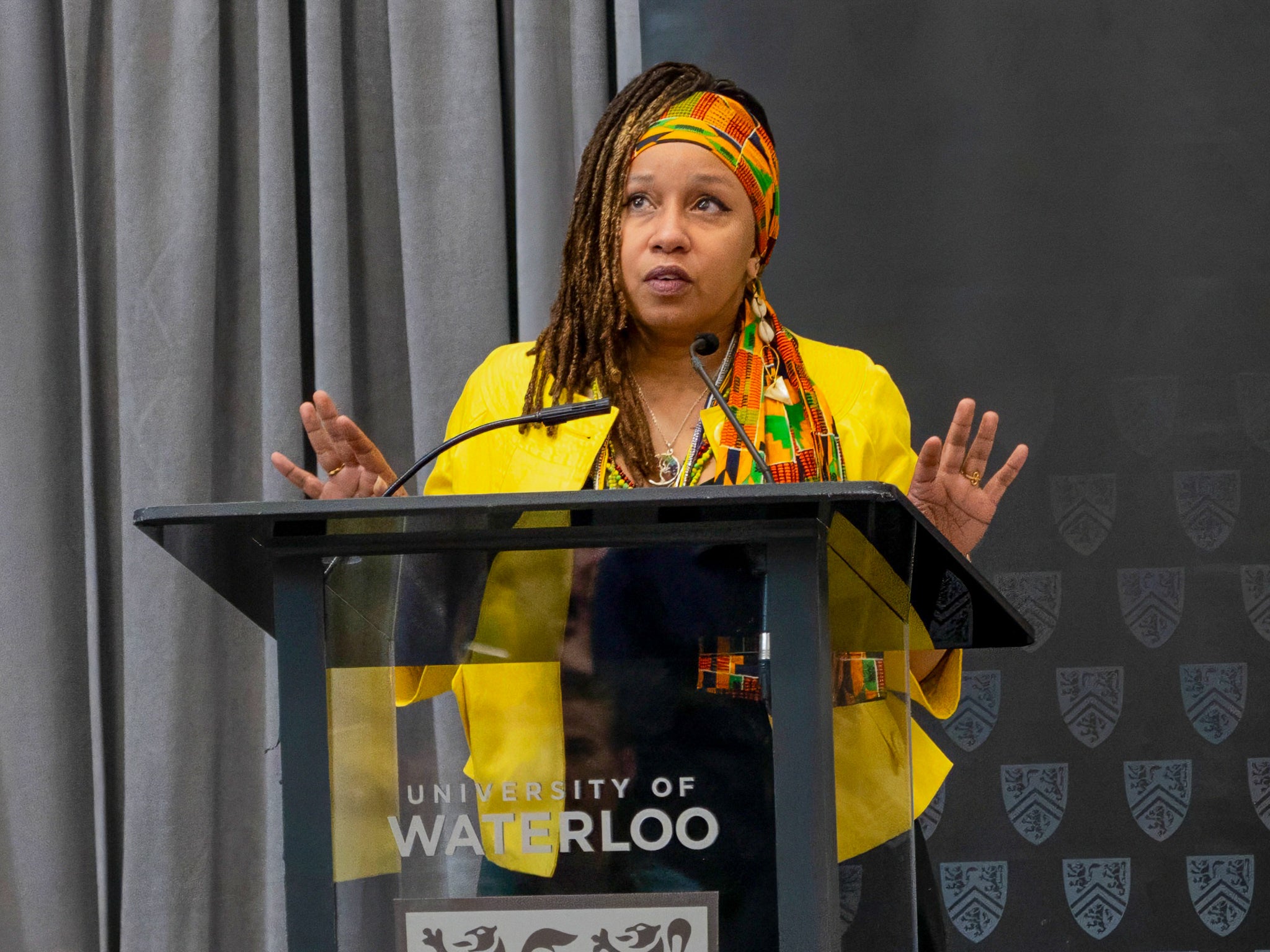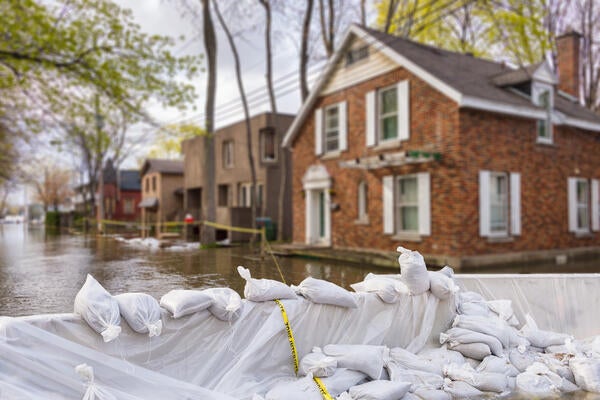
Hope over fear: Standing up to intolerance
Campus members come together to stand in solidarity and support on the anniversary of the Hagey Hall attack

Campus members come together to stand in solidarity and support on the anniversary of the Hagey Hall attack
By Angelica Marie Sanchez University RelationsThe University of Waterloo marked the one-year anniversary of the Hagey Hall attack, a moment of hate-motivated violence that deeply impacted our community.
More than 150 campus members gathered inside the Hagey Hall Hub on June 28, in solidarity and support of everyone who had to confront violence and experience trauma that day. While standing together, the community was standing up against gender-based violence and all forms of hatred and bigotry.
Dr. Sheila Ager, dean of the Faculty of Arts, and Dr. Laura Mae Lindo, professor in the Department of Philosophy, shared their remarks on the importance of coming together and making a statement that there is no place for hate and violence on our campus. Elder Myeengun Henry, Indigenous Knowledge Keeper, offered the traditional ceremony of smudging to help find the courage and peace we need as we work on healing together as a community.
Eleanor McMahon, vice-president of University Relations, reflected on the significance of the Stand Together event. She said, “This increase in hostility underscores the importance of our gathering today. We are here to reaffirm our support for freedom of gender expression and identity. We are here to say unequivocally that hate has no place in our community.”

Eleanor McMahon, vice-president of University Relations, reflected on the significance of the event and thanked everyone for coming to stand together in solidarity and support.
McMahon invited Dr. Ager, on her last day as dean, to share a few words to the audience. Ager recalled how she was sitting at Dana Porter Library just before the gathering that occurred last year in the Arts quad, and she remembered feeling disjointed and filled with rage, while trying to come up with a reflection to share with the community on the hate-motivated attack that took place on campus.
“That emotion has mellowed somewhat, but I confess, it resurfaces every time I hear of another hate crime or another act of intolerance and bigotry,” Ager said. “Society today seems to be racing towards an ever-greater polarization, towards the kind of rigid thinking that classifies everything and everyone as either good or bad, friend or enemy —that leaves no room for nuance, for benign difference, for respectful disagreement. This polarization, or worse, splintering into multiple poles, culminates in a society in constant collision with itself.”
Ager believes that unlearning things that we think we’ve learned and understand is an important step on the pathway to self-reflection and self-examination. Ager reflected on how the Antagonism and Intimidation in Academia Speaker Series was a step for us to learn and understand the experiences of faculty members across a wide variety of disciplines, where they have come under attack because of what they teach and research.
Participants from the From Targeting in Academia to Promoting Trust and Understanding conference, an extension of the speaker series, also joined the Stand Together event between their sessions.
“My friends, love is better than anger, hope is better than fear, and optimism is better than despair. So let us be loving, hopeful and optimistic, and we will change the world,” said Ager, who felt bittersweet during her last few days at Waterloo but was happy that her last official action as dean involved standing together with the community.

Dr. Sheila Ager, on her last day as dean of the Faculty of Arts, speaking to the Waterloo community at the Stand Together event.
Dr. Lindo recalled standing outside of the Dana Porter Library last year during the gathering, not only as a member of the Provincial Parliament, but also as a professor about to start tenure in the Department of Philosophy, specifically in the Gender and Social Justice program. She also remembered how her future colleagues were mortified but not necessarily shocked because they spent their career talking about things that nobody wants to talk about.
“There is a level of understanding about what could happen, a wish that it won't happen, but a recognition that when it does, you will be standing together, because as a collective, we've chosen to speak about things that other folks might see as unspeakable,” Dr. Lindo said.
Dr. Lindo acknowledged the strength and wisdom of her colleagues to continue teaching and having conversations around gender expression and identity, so students will have the courage to speak out against all types of injustice and create a better future for our community that stems from a place of love, care and compassion.
“You can't fight hate in one area and not fight injustice in another area. As we come together and we're going to stand together, then I need us to take a really deep breath and recognize that the people who put themselves on the front lines in courses, like the gender and social justice course, are doing so to instill within students the courage to stand up to intolerance in whichever area it appears, when it appears.”

Dr. Laura Mae Lindo, a professor in the Department of Philosophy and Gender and Social Justice program, shared a beautiful song to ground herself, before sharing her reflection and wisdom during the Stand Together event.
We acknowledge that this day may bring up difficult emotions for many in our community. Please reach out if you need support.
Students
If you feel overwhelmed or anxious and need to talk to somebody, please contact Counselling Services at Campus Wellness: 519-888-4096. In-person and virtual supports are available. If needed, please communicate with your supervisor or professor about temporary adjustments to work or studies.
Faculty and Staff
Our Employee and Family Assistance Program is available 24/7 for counselling, coaching and support. Call 1-800-663-1142 or visit Homeweb.ca for resources and support when you need it.
These community supports are available as well:

Read more
A message from President Goel

Read more
Researchers awarded funding to investigate ecology, climate change, repatriation, health and well-being through cultural and historical lens

Read more
Waterloo researchers propose solution to help communities escape the costly cycle of flood damage and rebuilding
The University of Waterloo acknowledges that much of our work takes place on the traditional territory of the Neutral, Anishinaabeg, and Haudenosaunee peoples. Our main campus is situated on the Haldimand Tract, the land granted to the Six Nations that includes six miles on each side of the Grand River. Our active work toward reconciliation takes place across our campuses through research, learning, teaching, and community building, and is co-ordinated within the Office of Indigenous Relations.